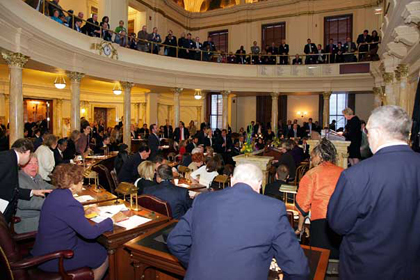
Sweeney, Weinberg, Vitale & Gill Say Medicaid Expansion Will Also Benefit NJ Financially
Trenton – New Jersey should take advantage of the opportunity to extend health care coverage to hundreds of thousands of the uninsured by accepting the offer from the federal government to expand the Medicaid program, Senate President Steve Sweeney, Senate Majority Leader Loretta Weinberg, Senator Joe Vitale and Senator Nia Gill said on Wednesday. A key component of the national health care reforms, the Medicaid expansion would be fully funded by the federal government the first three years and phased down over three years to cover 90 percent of those costs permanently.
New Jersey would receive an estimated $22 billion in federal funds over the first eight years, according to a report by New Jersey Policy Perspective.
“The Medicaid expansion is an opportunity to extend health care coverage to a large segment of the uninsured at no cost for three years and then have the federal government pay the lion’s share every year after,” said Senate President Sweeney. “This is the right thing to do for people who can’t afford health insurance and the smart thing to do for the state. It could provide additional financial savings for the state by reducing the cost of compensating hospitals for treating uninsured patients.”
The population that would be covered by the expansion makes up a large portion of uninsured patients forced to use emergency rooms to get care. The cost to the state for reimbursing hospitals is now $675 million annually, an expense that could be reduced by extending coverage to the uninsured.
A Rutgers-Eagleton Poll released today showed strong public support for Medicaid expansion, as well as increased support for the Affordable Care Act following the U.S. Supreme Court’s decision affirming the law’s constitutionality.
The governor has balked at the opportunity to accept the expansion, saying he doesn’t think it is needed, Senate Majority Leader Weinberg noted.
“I believe the need is obvious by just looking at the number of people it will help and the financial benefits to the state,” said Senator Weinberg. “I hope the governor isn’t using political calculations to determine his position.”
The health reform law increases Medicaid eligibility to 133 percent of the federal poverty level, extending coverage to at least 234,000 in New Jersey, according to a study by the Rutgers Center for State Health Policy. Most are childless adults – who constitute the largest segment of New Jersey residents who lack health insurance – who currently aren’t eligible in New Jersey.
A family of two with an income of $20,123 and a family of four with an income of $30,657 would be at 133 percent of the poverty rate, according to the Rutgers report.
“The failure to accept the expansion will create the equivalent of a Medicaid donut hole,” said Senator Vitale, the chairman of the Senate Health, Human Services and Senior Citizens Committee. “The health reform law will provide affordable subsidies to those who earn from 133 percent to 400 percent of the poverty level but the Medicaid expansion is needed to cover those below 133 percent. Without it, a large segment of people who need help the most will be denied affordable coverage.”
Senator Gill also urged the governor to put the health exchange in place for New Jersey.
“The fate of the state’s uninsured and underinsured residents cannot be decided based on the political whims of this administration,” said Senator Gill, chair of the Senate Commerce Committee and sponsor of legislation to create a state-based health exchange in New Jersey. “Federal health reform will make coverage accessible to hundreds of thousands of New Jerseyans who are currently without it. In addition to the Medicaid expansion, it is critical that we have an exchange that meets the particular needs of the state’s consumers rather than the one-size-fits-all approach of allowing the federal government to run our exchange. On both fronts, I urge the governor to do what is right for the state.”
Because the Medicaid expansion is part of the larger national health care reform law, some Republicans have been playing politics with an issue that should be about health care for those in need as well as the long-term finances of states, the Democratic senators said. The governor’s public positions on the landmark health reform law have changed over the months. Governor Christie, an active political surrogate for Mitt Romney, repeatedly had said that he would wait for the Supreme Court to decide on the constitutionality of the Affordable Care Act, even writing in his conditional veto of legislation that would establish a state exchange to manage reform that he would “fully oversee New Jersey’s compliance” with the law once the Court affirmed it. Now he says he’ll wait for the November election, mimicking the position taken by Romney.

